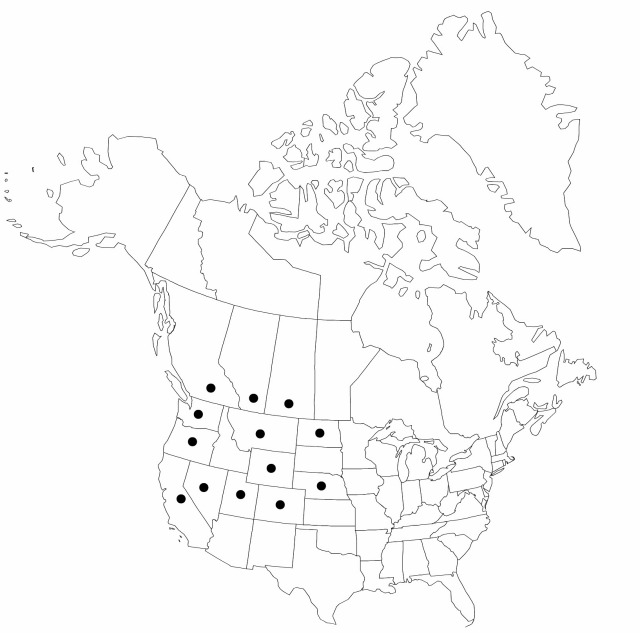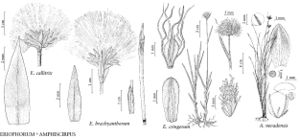Difference between revisions of "Amphiscirpus nevadensis"
Notes Roy. Bot. Gard. Edinburgh 33: 308. 1974.
FNA>Volume Importer |
FNA>Volume Importer |
(No difference)
| |
Revision as of 19:08, 24 September 2019
Rhizomes 1–4 mm diam., tough, hard. Culms ridged, 10–70 cm × 0.5–2 mm, hard, without evident internal air cavities. Leaves 5–10; sheaths loose, the proximal often disintegrating to prominent fibers, often stramineous or brownish, papery, fronts membranous-hyaline with delicate veins, summit slightly concave with V-shaped veinless area and often disintegrating; blades 0.5–1 times as long as culms, hard, without evident internal air cavities; distal blades 3–30 cm × 0.5–2 mm, longer than sheaths, margins sparsely antrorsely spinulose or papillose, apex sharply acute. Inflorescences: proximal involucral bract 1–15 cm, resembling foliage leaf blade. Spikelets ovoid to lanceoloid or terete, 5–20 × 3–5 mm; scales pale to dark red-brown, midribs usually stramineous, smooth; proximal 1 or 2 scales often resembling involucral bracts, with awnlike blades, to 15 mm; other scales in proximal part of spikelet prominently 9-veined, ovate, 4 × 3 mm, papery to often cartilaginous, margins hyaline, ciliolate, apex entire, acute to rounded. Flowers: perianth bristles pale brown, unequal. Achenes greenish to orange-brown, broadly obovoid, 2–2.3 × 1.5–1.7 mm.
Phenology: Fruiting summer.
Habitat: Sunny, saline, often alkaline, seasonally wet places
Elevation: 400–2400 m
Distribution

Alta., B.C., Sask., Calif., Colo., Mont., Nebr., Nev., N.Dak., Oreg., Utah, Wash., Wyo., South America (Argentina, Chile).
Discussion
Amphiscirpus nevadensis superficially resembles some dwarfed forms of Schoenoplectus pungens, with which it sometimes grows; S. pungens is readily distinguished by its trigonous culms and leaf blades, prominently 2-fid, awned scales, and beaked achenes. Amphiscirpus nevadensis differs from all North American species of Schoenoplectus in its wiry culms and leaves, prominently ciliate ligules, absence of evident internal aerenchyma, and beakless achenes. It has been reported from Delta, Manitoba.
Selected References
None.
